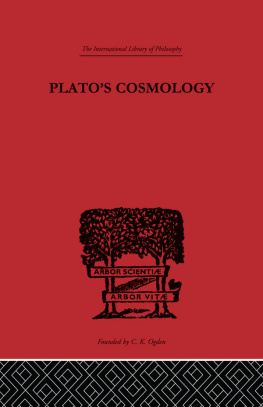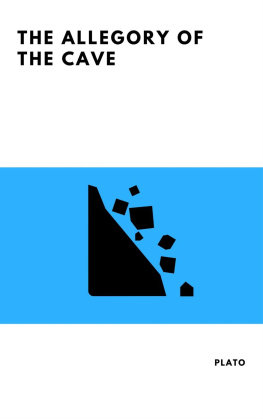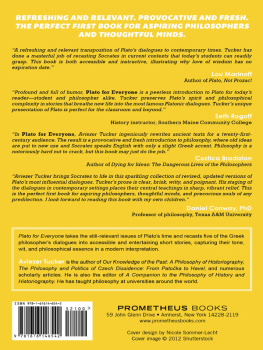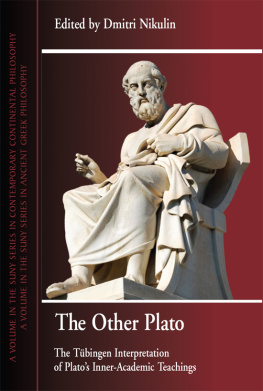H aving been persuaded by Platos Republic that Justice requires the philosopher to go back down into the Cave, William Henry Furness Altman devoted his professional life to the cause of public education; since retiring in 2013, he has been working as an independent scholar. Born in Washington, DC, where he was educated at the Sidwell Friends School, and with degrees in philosophy from Wesleyan University, the University of Toronto, and the Universidade Federal de Santa Catarina, he was a public high school teacher in Vermont, California, Massachusetts, Connecticut, and Virginia; between 1980 and 2013, he taught social studies, history, philosophy, English, drama, and Latin as well as offering extra curricular instruction in Ancient Greek. He began publishing scholarly articles in philosophy, intellectual history, and classics in 2007, and received his doctorate in 2010 with a dissertation on Hegel. Five volumes devoted to the reading order of Platos dialogues beginning with Plato the Teacher: The Crisis of the Republic (2012) have been published by Lexington Books; the series includes The Guardians in Action: Plato the Teacher and the Post-Republic Dialogues from Timaeus to Theaetetus (2016), The Guardians on Trial: The reading order of Platos Dialogues from Euthyphro to Phaedo (2016), Ascent to the Good: The Reading Order of Platos Dialogues from Symposium to Republic (2018), and Ascent to the Beautiful: Plato the Teacher and the Pre- Republic Dialogues from Protagoras to Symposium (2020). With the publication of Friedrich Wilhelm Nietzsche: The Philosopher of the Second Reich (Lexington, 2013), he completed A German Trilogy that includes Martin Heidegger and the First World War: Being and Time as Funeral Oration (Lexington, 2012) and his first book, The German Stranger:Leo Strauss and National Socialism (Lexington, 2011). He is also the author of The Revival of Platonism in Ciceros Late Philosophy: Platonis aemulus and the Invention of Cicero (Lexington, 2016), and the editor of Brills Companion to the Reception of Cicero (Brill, 2015). He is presently working on another trilogy about the origins, practice, and deformation of Platonism comprised by The Relay Race of Virtue: Platos Debts to Xenophon (SUNY, 2022), the present book, and a work in progress titled Plotinus the Master and the Apotheosis of Imperial Platonism. He has two sons, Philip and Elias, two grandchildren, and is married to Zoraide; they currently divide their time between Calais, Vermont, and Florianpolis, the island capital of Santa Catarina (Brasil).
T his books purpose to validate the ancient evidence that Demosthenes and other patriotic fourth-century Athenian statesmen were Platos students, thus providing external evidence for a reading of the Platonic dialogues presented in a series of five volumes already published by Lexington Books, an imprint of Rowman & Littlefield. Based on the hypothesis that Platos dialogues constituted the original curriculum of the Academy, Plato the Teacher and its companions broke with tradition by presenting Plato as more like a high school teacher than a university professor or think-tank director, writing entertaining and accessible dialogues for the betterment of the youth. Through studying these challenging dialogues, young Athenians between the ages of fourteen and eighteen would acquire the kind of civic and selfless virtue that would that would ultimately benefit Athens and preserve the freedom to philosophize that the city dedicated to the goddess of wisdom had made possible. If this was Platos goal, he fulfilled it primarily through the eloquent Demosthenes, last great defender of Athenian democracy in the face of Macedonian tyranny. At the center of this Athens-centric conception of both the Old Academy and its first students stands the Allegory of the Cave in Platos Republic, the most famous and frequently excerpted passage from the dialogues. Beginning with Plato the Teacher, I presented the Cave Allegory as a summons, challenging philosophers to return to the dangers of a political life in a democratic city. Since these books were written by a public high school teacher who lacked the elite credentials and customary advantages of a university affiliation, it required an act of faith on the part of the professionals at Rowman & Littlefield to publish them, and now, in an extension of that faith, to publish this book, dependent as it is on views developed at length elsewhere. It is difficult to imagine that any other press would be willing to publish such a book and it is therefore a pleasure and a privilege for me to express profound gratitude for a working relationship that began more than a decade ago. In particular, thanks are due to Jana Hodges-Kluck, Julie Kirsch, Nicolette Amstutz, and Lexingtons editorial board.
It is also a pleasure to acknowledge the help I received from important and highly credentialed scholars. Harold Tarrant provided necessary encouragement at the very beginning, and early conversations with Matthias Haake helped me focus the project. Laurent Pernot, Kai Trampedach, and Irene Giaquinta made their books available to me, and Judson Herrmann taught me how to read Demosthenic Greek. Ryan Balot, David Konstan, Tony Preus, and an anonymous reader also made valuable contributions. But since writing this book required connecting Platos dialogues to fourth-century events, I was in desperate need of guidance from scholars with an expertise in ancient history, and I was fortunate enough to find it. Profound gratitude is therefore due as well to Anthony Natoli and Robin Waterfield, both of whom were kind enough to read the whole manuscript, making hundreds of suggestions, comments and corrections; their generosity has been exemplary and deserves both praise and imitation. Naturally the errors and instances of intemperance that remain are neither their responsibility nor anyone elses other than mine.
As usual, I have considerable debts to my family. To begin with, this book was written while my beloved sister, Leslie Rescorla (19452020), was struggling with cancer; her courage in the face of pain and death inspired me. At the other end of the life cycle, my grandchildren, Eliza and James, are a daily source of delight, and I am grateful to their parents, Erin Rafferty and my son Philip, for making me an important part of their precious young lives. From my son Elias, I continue to receive not only familial but also technological support; his advice and courage have been indispensable and inspirational. But first and foremost, as the daily source of my inspiration, and the spiritual as well as physical basis of my life as a scholar, stands my beloved wife, Zoraide: your bright-eyed delight, passion, caution, and loving support command my respect, gratitude, and love as always. For everything you have done to make this book and its companions possible, my darling, there are no unsung words.
Florianpolis
March 14, 2022
Accame, Silvio. Demostene e linsegnamento di Platone. Milan: Carlo Marzorati, 1947.
Adkins, Arthur W. H. Merit and Responsibility. Oxford: Oxford University Press, 1960.
Aelius Aristides, volume 1; text and translation by C. A. Behr. Cambridge, MA: Harvard University Press, 1973.
. Orations, volume 2; edited and translated by Michael Trapp. Cambridge, MA: Harvard University Press, 2021.
Aeschines, The Speeches of Aeschines. Translated by C. D. Adams. London: William Heinemann, 1929.
Allen, Danielle S. Changing the Authoritative Voice: Lycurgus Against Leo-crates. Classical Antiquity 19, no. 1 (April 2000), 533.
. Talking about Revolutions: On Political Change in Fourthcentury Athens and Historiographic Method in Simon Goldhill and Robin Osbourne (eds.),







